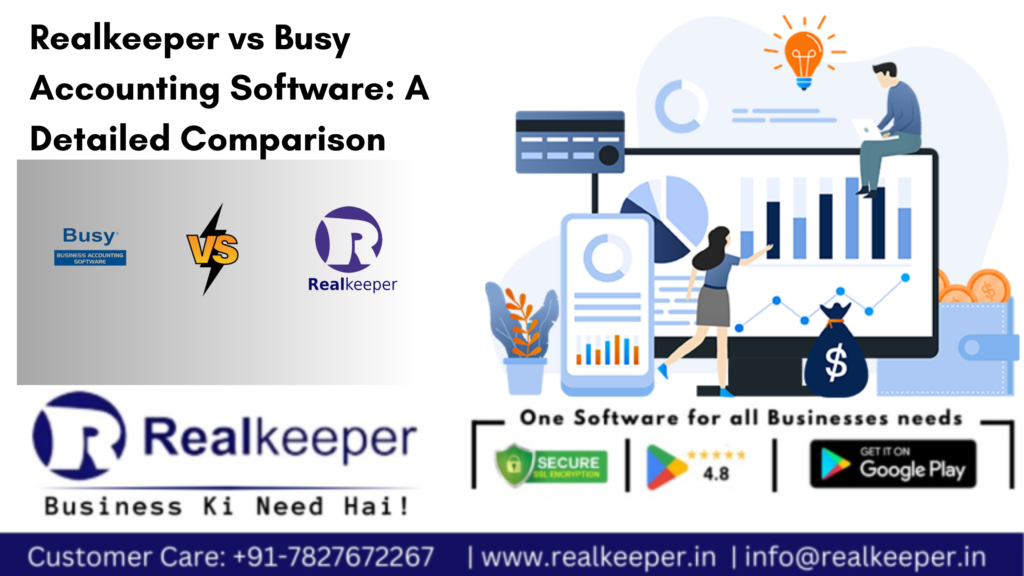
When it comes to choosing accounting software, businesses often find themselves comparing various solutions to find the one that best suits their needs. Among the most popular options in the market are Realkeeper and Busy Accounting Software. Both offer robust features designed to streamline financial management, but they cater to different user needs. In this blog, we’ll dive into a detailed comparison of Realkeeper and Busy Accounting Software, examining key factors like usability, features, pricing, and more.
1. Ease of Use
Realkeeper is known for its user-friendly interface and intuitive design, making it ideal for users who are new to accounting software. The dashboard provides easy access to essential features such as invoicing, expense tracking, and financial reporting, all of which are organized in a straightforward manner. Realkeeper emphasizes a minimal learning curve, which is beneficial for small business owners and freelancers who may not have extensive accounting experience.
On the other hand, Busy Accounting Software offers a more complex interface. While it is feature-rich, it may take time for users to get accustomed to its layout and navigation. Busy is more suitable for medium to large businesses that require comprehensive accounting functionalities and have teams dedicated to handling financial management.
Verdict: Realkeeper wins in ease of use, especially for beginners and small business owners, while Busy is better suited for advanced users who need more intricate tools.
2. Features and Functionality
Both Realkeeper and Busy Accounting Software come packed with features, but they cater to different kinds of businesses:
- Realkeeper offers features that focus on automation and simplicity. It includes automated invoicing, expense management, tax calculations, multi-currency support, and financial reporting. It also has cloud capabilities, which means users can access their data from anywhere. Realkeeper is particularly useful for freelancers, small businesses, and startups that need a simple yet effective solution for managing their finances.
- Busy Accounting Software is designed with more robust features for businesses that require in-depth accounting solutions. Busy offers inventory management, multi-location billing, payroll, and advanced tax management for industries like manufacturing and trading. Busy is also highly customizable, which makes it a good fit for larger businesses with more specific accounting requirements.
Verdict: Realkeeper is better for businesses that need an easy-to-use, automated accounting solution, while Busy is more appropriate for companies requiring a comprehensive and customizable system.
3. Industry Focus
- Realkeeper is designed to serve small businesses, freelancers, startups, and service providers. It provides industry-specific solutions such as GST-compliant invoicing and expense management tailored for these users.
- Busy Accounting Software focuses on medium to large businesses across various sectors, including manufacturing, retail, and wholesale. Busy offers specialized features like inventory management and multi-location handling, making it a good choice for businesses with more complex operational needs.
Verdict: Realkeeper is best for smaller companies, freelancers, and startups, while Busy is ideal for industries that require advanced features such as inventory management and multi-location billing.
4. Cloud vs. Desktop-Based
In today’s fast-paced business environment, cloud-based software offers significant advantages:
- Realkeeper is a cloud-based solution, allowing users to access their accounts from anywhere with an internet connection. This flexibility is especially useful for businesses that operate remotely or need real-time collaboration between team members. Cloud-based solutions are also easier to update and maintain since updates are done automatically.
- Busy Accounting Software is primarily desktop-based, although it does offer a cloud version for an additional cost. The desktop version may appeal to businesses that prefer to keep their financial data stored locally, but it may lack the flexibility that Realkeeper’s cloud capabilities provide.
Verdict: Realkeeper’s cloud-based solution offers greater flexibility, making it ideal for modern businesses that require anytime, anywhere access. Busy’s desktop solution, however, is beneficial for businesses that prioritize local data storage.
5. Pricing
- Realkeeper offers competitive pricing, with various plans designed for freelancers, startups, and small to medium businesses. The subscription model is cost-effective, and businesses can choose a plan that aligns with their needs, avoiding any unnecessary expenses on features they don’t require.
- Busy Accounting Software follows a more traditional pricing model, offering one-time purchases for its desktop versions, along with yearly maintenance costs. The cloud version, which is more in line with Realkeeper, is offered at a higher price point.
Verdict: Realkeeper is more budget-friendly, especially for startups and freelancers. Busy can be more expensive, particularly if opting for the cloud version or additional features.
6. Customer Support
Both Realkeeper and Busy provide customer support, but there are key differences in how support is delivered:
- Realkeeper offers a range of support options, including live chat, email support, and a comprehensive knowledge base. Realkeeper also provides personalized onboarding support, which ensures users can set up their accounting system quickly and efficiently.
- Busy Accounting Software offers email support and a ticketing system. While the support is reliable, it may not be as immediately accessible as Realkeeper’s live chat feature.
Verdict: Realkeeper provides more immediate support options, which is beneficial for small businesses that may need quick assistance.
7. Scalability
As your business grows, so too will your accounting needs. Both Realkeeper and Busy offer scalable solutions, but they cater to different types of growth:
- Realkeeper is designed to grow with small businesses and startups. It offers a range of plans, making it easy for users to upgrade as their business expands. Its cloud-based nature also ensures that the software can handle increased data and user activity without performance issues.
- Busy Accounting Software is ideal for businesses that anticipate needing more advanced features in the future, such as advanced inventory management, payroll, and multi-location billing. Busy’s comprehensive features are perfect for businesses that are scaling beyond the capabilities of basic accounting software.
Verdict: Realkeeper is scalable for small to medium-sized businesses, while Busy is more suited for larger businesses that require advanced functionality as they grow.
8. Conclusion: Which Software is Right for You?
In conclusion, the choice between Realkeeper and Busy Accounting Software comes down to the size and needs of your business:
- If you are a freelancer, small business, or startup looking for a simple, cloud-based, and cost-effective accounting solution, Realkeeper is the best option. Its ease of use, automated features, and affordability make it ideal for smaller companies that need to get up and running quickly.
- If you run a medium to large business that requires advanced accounting features, such as inventory management, payroll, and multi-location billing, Busy Accounting Software is a better fit. Its extensive features, although more complex, can handle the diverse needs of larger organizations.
Realkeeper stands out for its simplicity and accessibility, while Busy excels in providing comprehensive accounting solutions for larger businesses. Understanding your specific needs and how your business is likely to grow will help you make the best choice.
4oWhen it comes to choosing accounting software, businesses often find themselves comparing various solutions to find the one that best suits their needs. Among the most popular options in the market are Realkeeper and Busy Accounting Software. Both offer robust features designed to streamline financial management, but they cater to different user needs. In this blog, we’ll dive into a detailed comparison of Realkeeper and Busy Accounting Software, examining key factors like usability, features, pricing, and more.
1. Ease of Use
Realkeeper is known for its user-friendly interface and intuitive design, making it ideal for users who are new to accounting software. The dashboard provides easy access to essential features such as invoicing, expense tracking, and financial reporting, all of which are organized in a straightforward manner. Realkeeper emphasizes a minimal learning curve, which is beneficial for small business owners and freelancers who may not have extensive accounting experience.
On the other hand, Busy Accounting Software offers a more complex interface. While it is feature-rich, it may take time for users to get accustomed to its layout and navigation. Busy is more suitable for medium to large businesses that require comprehensive accounting functionalities and have teams dedicated to handling financial management.
Verdict: Realkeeper wins in ease of use, especially for beginners and small business owners, while Busy is better suited for advanced users who need more intricate tools.
2. Features and Functionality
Both Realkeeper and Busy Accounting Software come packed with features, but they cater to different kinds of businesses:
- Realkeeper offers features that focus on automation and simplicity. It includes automated invoicing, expense management, tax calculations, multi-currency support, and financial reporting. It also has cloud capabilities, which means users can access their data from anywhere. Realkeeper is particularly useful for freelancers, small businesses, and startups that need a simple yet effective solution for managing their finances.
- Busy Accounting Software is designed with more robust features for businesses that require in-depth accounting solutions. Busy offers inventory management, multi-location billing, payroll, and advanced tax management for industries like manufacturing and trading. Busy is also highly customizable, which makes it a good fit for larger businesses with more specific accounting requirements.
Verdict: Realkeeper is better for businesses that need an easy-to-use, automated accounting solution, while Busy is more appropriate for companies requiring a comprehensive and customizable system.
3. Industry Focus
- Realkeeper is designed to serve small businesses, freelancers, startups, and service providers. It provides industry-specific solutions such as GST-compliant invoicing and expense management tailored for these users.
- Busy Accounting Software focuses on medium to large businesses across various sectors, including manufacturing, retail, and wholesale. Busy offers specialized features like inventory management and multi-location handling, making it a good choice for businesses with more complex operational needs.
Verdict: Realkeeper is best for smaller companies, freelancers, and startups, while Busy is ideal for industries that require advanced features such as inventory management and multi-location billing.
4. Cloud vs. Desktop-Based
In today’s fast-paced business environment, cloud-based software offers significant advantages:
- Realkeeper is a cloud-based solution, allowing users to access their accounts from anywhere with an internet connection. This flexibility is especially useful for businesses that operate remotely or need real-time collaboration between team members. Cloud-based solutions are also easier to update and maintain since updates are done automatically.
- Busy Accounting Software is primarily desktop-based, although it does offer a cloud version for an additional cost. The desktop version may appeal to businesses that prefer to keep their financial data stored locally, but it may lack the flexibility that Realkeeper’s cloud capabilities provide.
Verdict: Realkeeper’s cloud-based solution offers greater flexibility, making it ideal for modern businesses that require anytime, anywhere access. Busy’s desktop solution, however, is beneficial for businesses that prioritize local data storage.
5. Pricing
- Realkeeper offers competitive pricing, with various plans designed for freelancers, startups, and small to medium businesses. The subscription model is cost-effective, and businesses can choose a plan that aligns with their needs, avoiding any unnecessary expenses on features they don’t require.
- Busy Accounting Software follows a more traditional pricing model, offering one-time purchases for its desktop versions, along with yearly maintenance costs. The cloud version, which is more in line with Realkeeper, is offered at a higher price point.
Verdict: Realkeeper is more budget-friendly, especially for startups and freelancers. Busy can be more expensive, particularly if opting for the cloud version or additional features.
6. Customer Support
Both Realkeeper and Busy provide customer support, but there are key differences in how support is delivered:
- Realkeeper offers a range of support options, including live chat, email support, and a comprehensive knowledge base. Realkeeper also provides personalized onboarding support, which ensures users can set up their accounting system quickly and efficiently.
- Busy Accounting Software offers email support and a ticketing system. While the support is reliable, it may not be as immediately accessible as Realkeeper’s live chat feature.
Verdict: Realkeeper provides more immediate support options, which is beneficial for small businesses that may need quick assistance.
7. Scalability
As your business grows, so too will your accounting needs. Both Realkeeper and Busy offer scalable solutions, but they cater to different types of growth:
- Realkeeper is designed to grow with small businesses and startups. It offers a range of plans, making it easy for users to upgrade as their business expands. Its cloud-based nature also ensures that the software can handle increased data and user activity without performance issues.
- Busy Accounting Software is ideal for businesses that anticipate needing more advanced features in the future, such as advanced inventory management, payroll, and multi-location billing. Busy’s comprehensive features are perfect for businesses that are scaling beyond the capabilities of basic accounting software.
Verdict: Realkeeper is scalable for small to medium-sized businesses, while Busy is more suited for larger businesses that require advanced functionality as they grow.
8. Conclusion: Which Software is Right for You?
In conclusion, the choice between Realkeeper and Busy Accounting Software comes down to the size and needs of your business:
- If you are a freelancer, small business, or startup looking for a simple, cloud-based, and cost-effective accounting solution, Realkeeper is the best option. Its ease of use, automated features, and affordability make it ideal for smaller companies that need to get up and running quickly.
- If you run a medium to large business that requires advanced accounting features, such as inventory management, payroll, and multi-location billing, Busy Accounting Software is a better fit. Its extensive features, although more complex, can handle the diverse needs of larger organizations.
Realkeeper stands out for its simplicity and accessibility, while Busy excels in providing comprehensive accounting solutions for larger businesses. Understanding your specific needs and how your business is likely to grow will help you make the best choice.
4oWhen it comes to choosing accounting software, businesses often find themselves comparing various solutions to find the one that best suits their needs. Among the most popular options in the market are Realkeeper and Busy Accounting Software. Both offer robust features designed to streamline financial management, but they cater to different user needs. In this blog, we’ll dive into a detailed comparison of Realkeeper and Busy Accounting Software, examining key factors like usability, features, pricing, and more.



